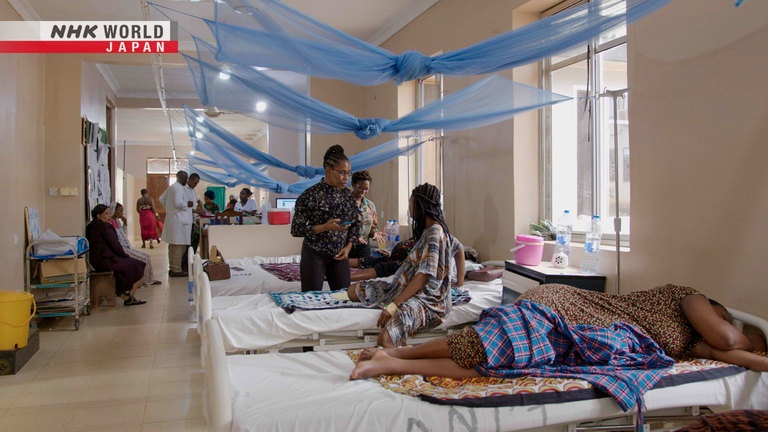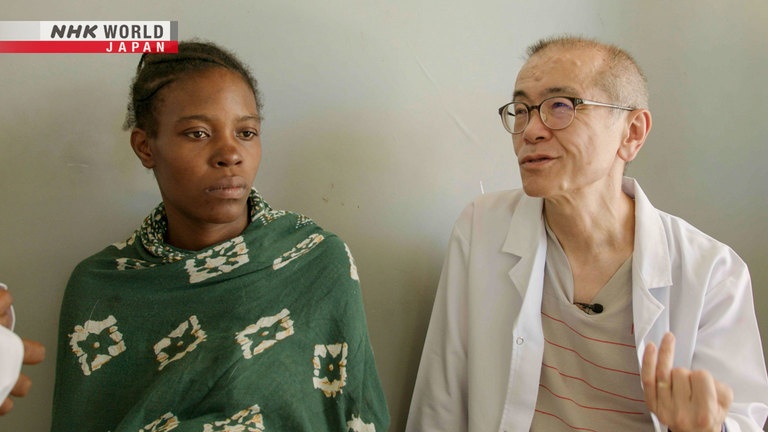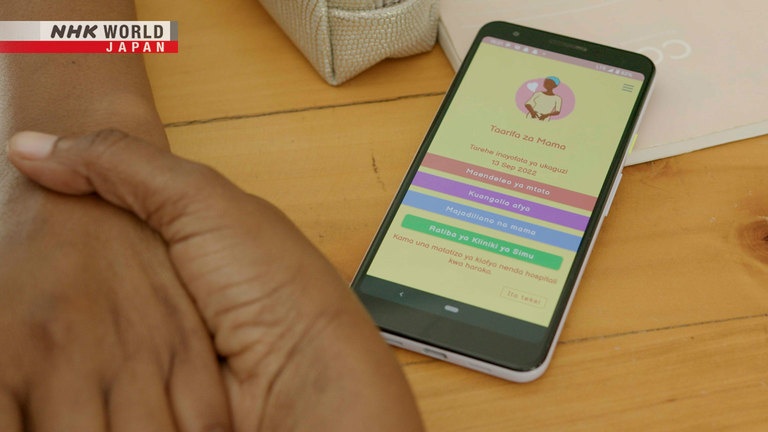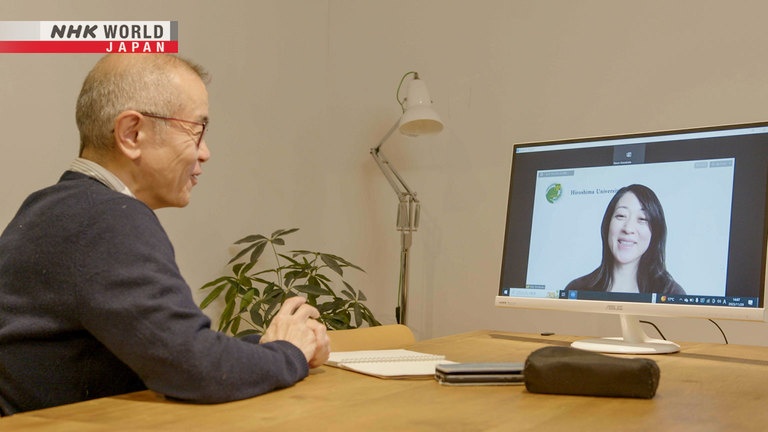Saving Mothers with Smartphone Apps: Tanzania
Tanzania is currently struggling with a high maternal mortality rate. Kawabata Yasuo and his team have developed an app for expectant mothers that they hope will help solve this issue.




Transcript
Tanzania is home to around 66 million people.
It boasts one of the fastest growing economies in East Africa, averaging an annual GDP growth of 5 percent over the last 25 years.
However, medical infrastructure remains underdeveloped, and the country faces a chronic shortage of doctors and nurses.
One particular issue Tanzania is struggling with is a high maternal mortality rate, with around 11,000 pregnant women dying each year.
The WHO recommends eight prenatal checks for every pregnancy,
but less than five percent of expectant mothers in Tanzania are reaching this goal.
"It's very painful and shocking to see
people dying every day in Tanzania."
"If they come in to get checked,
we can find issues and treat them."
"But if they don't get checked, we can't help.
That's a problem."
In 2017, a new project was launched with the goal of lowering Tanzania's maternal mortality rate.
A smartphone app has been deployed to encourage pregnant women to have more frequent prenatal checks.
The app serves as a digital medical record.
Expectant mothers log their ongoing health status, and medical staff can review this data during checkups.
Sometimes you can find a pregnant woman forget their antenatal card, but if it has been registered with Taarifa za Mkunga,
you can check that information, and then you can know what was happening before and then, what you are supposed to do.
Leading development and operations of the app is Japanese tech startup director Kawabata Yasuo.
"Tanzania's maternal mortality rate
is 100 times that of Japan's."
"Our goal is to convince expectant mothers to get
checked through the use of our app."
"This will help lower the
maternal mortality rate."
Meet the team looking to leverage technology to protect and empower pregnant women in Tanzania.
Today, Kawabata is headed to Kisarawe, a district about an hour's drive west from major city Dar es Salaam.
Kisarawe's population has grown by more than 50 percent over the last 10 years to 160,000.
But the region it's located in still suffers a high number of maternal deaths each year.
Kawabata's destination is the area's only general hospital, Kisarawe District Hospital.
With 108 beds, the hospital is relied upon by locals for all kinds of care, including cancer and infectious disease treatment.
The maternal ward's 6 doctors and 12 nurses receive around 20,000 pregnant women per year.
In June of 2023, the hospital adapted two apps made by Japanese start up Castalia for medical staff and patients.
Kawabata has come to conduct a user survey, so he can improve their features.
He believes that meeting users and getting direct feedback from them is an important aspect of app development.
He is aided in this survey work by Neema Haule, who has been working as a local coordinator for the project since the app's launch.
"What's your name?"
"Mui Said Badiri."
This patient is scheduled to give birth in the next few days.
"Are you having any health issues
due to your pregnancy?"
"I have high blood pressure."
"Are your legs swollen?"
"No, they're not."
"Okay, has your water broken yet?"
"No, it hasn't yet."
Do you think it's useful for you?
So I want to know is it useful for her.
It's good for her.
So what is the most good thing?
That she can see the data of the baby?
Or the educational content or some other things?
What is the most useful, most good for her?
I like the bulletin board feature.
So she love the comment thing.
Always pregnant woman says the same thing.
One of the two apps that Kawabata's team developed is called Taarifa za Mama.
Aimed at expectant mothers, the name means "Mother's Information" in Swahili.
The app has four main features.
The first feature allows users to check information related to their pregnancy and upcoming delivery.
The second feature allows expectant mothers to check up on their current health through regular surveys.
If the app finds they may have a health issue, it will recommend they visit a hospital for treatment.
The next feature is an educational content section that allows expectant mothers to learn about maternal health.
It includes an audio function for users who have trouble reading.
"You may see mucus or brown liquid."
"This is a sign that the cervix has
softened and is ready for delivery."
The fourth feature is a bulletin board system that allows pregnant women to discuss their questions and opinions with midwives.
When expectant mothers are confused or concerned about something related to their pregnancy,
they can write it on the bulletin board, and a midwife or local staff will answer their questions.
By getting accurate advice, pregnant women can better maintain their health,
making it a popular feature that has gathered more than 2000 posts so far.
"Please stay still."
"I'll take your blood pressure now."
The app used by midwives and doctors is called "Taarifa za Mkunga," meaning Midwife's Information.
It serves as a digital medical record connected to the maternal app over the cloud,
allowing midwives to see their patients' health status before a prenatal checkup and send the results once it's done.
Midwives can also share this data with their colleagues.
During the week Kawabata spends in Tanzania, he will visit two hospitals that recently adopted the maternal health apps,
and survey as many expectant mothers as he can to improve usability.
"Have a good baby!"
The day after the Kisarawe District Hospital visit, we received some good news from Mui Said,
the expectant mother who said she liked the app's bulletin board feature.
- She's happy.
- It's a girl?
Yes, a girl.
Both she and her newborn daughter are in good health.
"I want her to be in movies someday,
like President Samia."
"And I want her to get
a good education."
Many new mothers like Mui Said will post messages on the bulletin board when they give birth,
prompting other expectant mothers and midwives to congratulate them.
"Tanzanians really value communication."
"So if they hear that someone had
a prenatal check and it helped them...
...they might also want to go."
"The WHO recommends eight prenatal
checks per pregnancy."
"So getting closer to that number
is our initial goal."
Castalia operates out of Tokyo.
The startup has grown its business by offering a mobile platform
that allows companies to develop their own language-learning and professional education apps.
In recent years, the team has been undertaking educational projects in several developing countries, with a focus on Africa.
Kawabata is based in Tokyo, but he visits Tanzania regularly to advance the development of the maternal health apps.
"I think education can change lives,
and not just for children."
"I'm married but I'm not a parent."
"This is part of the reason why I wanted
to do something for Tanzanian children."
The project is happening in collaboration with a qualified midwife who currently works as a university professor.
"I wanted to ask what you think is
the best way to get expectant mothers...
...to go in for more frequent hospital
visits going forward."
Since 2008, Hiroshima University professor Dr. Shimpuku Yoko has been involved in the creation of a number of educational programs
for midwives and expectant mothers.
"I think what I'm able to do is
teach other midwives."
"I wanted to give my support to the doctors
and everyone in Tanzania."
It was Shimpuku who first approached the startup to use their platform to create educational content for midwives,
sparking the collaboration.
In 2017, Muhimbili University of Health and Allied Sciences in Dar es Salaam also joined the project,
and the team launched an educational app for midwives.
"The midwives were very happy."
"The great thing about apps is that
we can update their content instantly."
However, despite the app improving midwives' knowledge,
it did not lead to an increase in the frequency of prenatal checkups among expectant mothers.
"We can't help expectant mothers
by only focusing on midwives."
"So we decided to develop an app
that would help women take action."
This was the starting point for the Taarifa za Mama project for expectant mothers.
The app launched in November of 2021.
So far, three hospitals have adopted the app, and it has already been used by over 500 women.
"I think there are many ways to lower
the maternal mortality rate."
"For example, improving facilities
or increasing staff numbers."
"I don't know if education is the best way,
but it's cheap and produces rapid results."
"If we can save lives with education,
I don't see a more efficient method."
As a local coordinator, Neema supports the project on the ground in Tanzania.
Today, she has come to a clinic in Homboza, a small village near Kisarawe.
This is the only clinic in the area, and residents rely on its three doctors for all of their primary care needs.
Neema's goal is to convince the clinic to adopt the maternal health apps.
She explains how to use them to the head doctor.
"So I tap here to start the checkup.
Then I measure the blood pressure."
"Then, after I finish the examination,
I enter the data, press save, and done."
"You can tap here to check if the
examination is finished."
"Then you can access and confirm the
mother's information here."
This expectant mother is in her 38th week of pregnancy.
She has come for just her second ever prenatal checkup.
The doctor takes handwritten notes, which will make it much harder to organize his records later on.
Neema decides to have a talk with the patient during her checkup.
- "How many children have you had?"
- "I've had four."
- "How old is the first one?"
- "15 years old."
- "And the next one?"
- "13 years old."
- "And the third one?"
- "The third one died."
- "When did they pass away?"
- "In 2017."
- "How old were they when they died?"
- "It was just after birth."
- "Are you feeling any physical pain?"
- "Only in my legs. My stomach doesn't hurt."
- "Have you had any vaginal discharge?"
- "Yes."
- "Since when?"
- "Since yesterday."
"That's the last sign before labor."
"Please come to the hospital
as soon as you feel anything."
Neema gives advice to expectant mothers every time she goes to a hospital or clinic,
having experienced the limitations of Tanzania's medical services during her own pregnancy.
Neema lives on the outskirts of Dar es Salaam.
Following university, she worked as an accountant, but quit her job in 2019 after she became pregnant with her first child.
She began working with Kawabata soon after giving birth.
"It's ready. Come over here."
"Sit and eat here. I'll bring juice."
Neema has two children, aged 4 and 1.
So, this one is Jayden.
Say hi, Jayden!
Through my first pregnancy, I faced a lot of challenges. Sometimes you can use until four to six hours, only to get some services.
Then, the crowd is high, sometimes the facility's very small. So, it's somehow challenging.
So, for my side, I wish there could be more improvement on every services whom the pregnant women is facing.
During Neema's second pregnancy, she discovered her husband had been unfaithful, and they separated.
I got some challenges the time of giving birth, he was not there for me. The last one, he was not there.
So as a woman, I feel some pain. I feel a lot of anger to him, but that's just life, so I move on.
She remains separated from her husband, and is not sure if he will return.
Hello, hello Yasuo.
Neema usually works remotely while taking care of her children at home.
An important part of her job is answering users' questions on Taarifa za Mama's bulletin board,
using her own personal experience as a well of knowledge.
"So having kids is like a blessing in your life, because when I wake up looking at them, they give me hope to go on with the life."
"They give me hope to fight more for them. I love them and they love me. So that's it."
Neema is working hard to improve health services for expectant mothers,
so that they too can experience the joy and fulfillment of parenthood.
In October of 2023, Kawabata and his team began a new project to lower Tanzania's maternal mortality rate.
Kawabata and Neema are headed to the site of this project to check on its development, but they face an arduous road to get there.
This is Bwama village, located about 4 hours from Dar es Salaam.
It takes 2 hours by motorcycle taxi to reach the closest hospital from here.
Upon arrival, the team finds a van full of medical equipment, and staff setting up inside a tent.
This is a mobile clinic used by midwives to check on expectant mothers in remote villages.
The project is designed to help connect pregnant women who are unable to reach hospitals with proper medical care.
Kawabata's goal is to recommend his app to expectant mothers who come to the mobile clinic for a checkup.
He's also investigating how the apps could help facilitate the mobile clinic's operations.
One couple has come for a pregnancy checkup.
"Do you have any questions?"
"You'll be coming here often."
- "Have you been pregnant before?"
- "It's my first time."
"Do you want a boy or a girl?"
"I'm a mother as well."
"I was asked the same thing
when I was pregnant."
- "I wanted a boy."
- "I also want a boy."
"I want a girl."
"So either one is good."
"Children are a blessing,
whether it's a boy or a girl."
"We'll use a device to help us
listen to your baby's heartbeat."
This is a cutting-edge medical device that can measure the heartbeat of a fetus and the contractions of its mother.
It can then share this data with a doctor in a remote location.
Japanese medical technology startup Melody International has provided the project with these devices.
Going forward, the team plans to add a mobile clinic scheduling feature to the maternal app,
so that pregnant women in villages such as this one can plan their prenatal checks more easily.
"Good morning, everyone."
"Are you okay for time now?"
"I'm okay, it's 4 a.m.
I don't have appointments at this time."
"Wow, you're awake at 4 a.m.?"
After he returns to Dar es Salaam, Kawabata shares his report of the mobile clinic's progress with the other project members,
including Doctor Shimpuku.
"The only public transportation there is
motorcycle taxis."
"This makes it very inconvenient."
"I can understand why people are so happy
that the mobile clinic is now going there."
"I had no cell signal on site, and the mobile
clinic workers didn't have any either."
"So connectivity is even more of a problem
than residents not having smartphones."
"I'll try to use this information to
help us develop new features."
The team knows there are obstacles ahead, but they're ready to take them head on.
Kawabata and Shimpuku are hopeful, seeing just how fast Tanzania's telecommunications infrastructure is growing every time they visit.
"I think the network infrastructure will
grow faster than the medical system."
"Mothers will then get better information
so they can go to hospitals when needed."
"I believe that this is what will bring down the
maternal mortality rate."
"This app will empower mothers with information."
"They will know themselves
when they need to go to a hospital."
"I hope every mother can get proper care
and give birth in the right conditions."
As Tanzania builds out its telecommunications infrastructure,
Kawabata and the project members are working hard to improve their app at the same pace.
They are united for a common cause: helping expectant mothers.